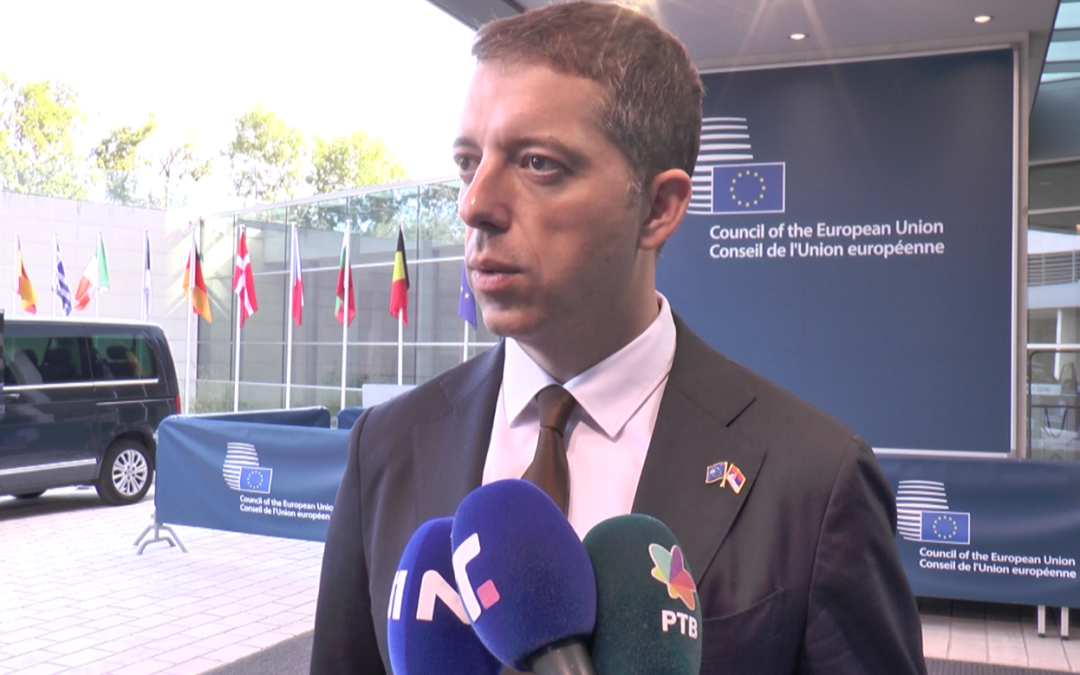Serbian Foreign Minister Marko Đurić stated during the EU Foreign Ministers’ meeting with representatives of the Western Balkans in Luxembourg that one of the absolute priorities for the new Serbian government is the implementation of the reform agenda by 2027 and emphasized that the EU stands to gain a lot from Serbia’s membership in the bloc. At the same time, he pointed out the difficult position of the Serbian people in Kosovo and Metohija and the need for stricter implementation of the Brussels Agreement. Đurić told reporters in Luxembourg that today is a “very important day for Serbia when it comes to European integration” as it was invited to attend a meeting of EU foreign ministers and Western Balkan representatives. He emphasized that he also had bilateral meetings with officials from certain member states, including a very productive discussion with Polish Foreign Minister Radosław Sikorski.
“We discussed how to accelerate and give new impetus to Serbia’s European integration. My message here was very clear. For the new Serbian government, implementing the reform agenda by 2027 is one of the absolute priorities, and we want, as far as we are concerned, to be fully ready by then, whether it comes to our economy, the rule of law, democracy, and all other aspects that are important for our full membership,” Đurić said.
At the same time, he added, his message was that the EU stands to gain a lot from the membership of Serbia and other partners from the Western Balkans, whether in terms of human capital, tradition, culture, knowledge, security, energy security, and many other aspects.
“I also sent the message that until then, I consider that the citizens of Serbia have the right and should gain access to EU funds because scientists, students, and farmers in Serbia should not have second-class status compared to farmers, scientists, and students in any other country. We are not interested in being just a secondary market or something similar, but we want a full-fledged seat and an equal place at the table,” Đurić emphasized, adding that Serbia wants to be an equal part of the European family like everyone else.
Regarding the Common Foreign and Security Policy (CFSP), Đurić said that with Serbia’s accession to the EU, it will have CFSP with the EU, when it will be in a position to influence that policy.
“Until then, we want to raise the level of our alignment with CFSP, but we are also seeking help to solve the issues from the past for which the current generations in Serbia are not responsible and which cannot be resolved fairly without the full engagement of the international community,” Đurić said.
In that context, he mentioned the violations of the collective rights of Serbs in Kosovo and Metohija, as well as the need for stricter and more aggressive implementation of the Brussels Agreement.
“I told the gathered European ministers, let’s help each other, let’s meet halfway, to accelerate this story about EU enlargement. You have a lot to gain from the strong Balkan hands, not only from Serbia but also from other countries in the region as new members,” Đurić said.
He also emphasized that Serbia is already significantly contributing to the EU’s CFSP, participating in European peace missions, and that in the case of the conflict in Ukraine, it has supported all UN resolutions “that supported and continue to support the territorial integrity of Ukraine.”
“We have specificities due to which we do not have the same foreign policy on this issue as other European members, but we expect the EU to help normalize relations in the region to a sufficient degree and generally improve the security and geopolitical situation in our region in a way that will in the future allow us to have a higher degree of alignment,” Đurić said.
Serbia will, he added, seek ways to protect its national interests while being as aligned as possible with that foreign and security policy.(24.06)
 go to the original language article
go to the original language article
